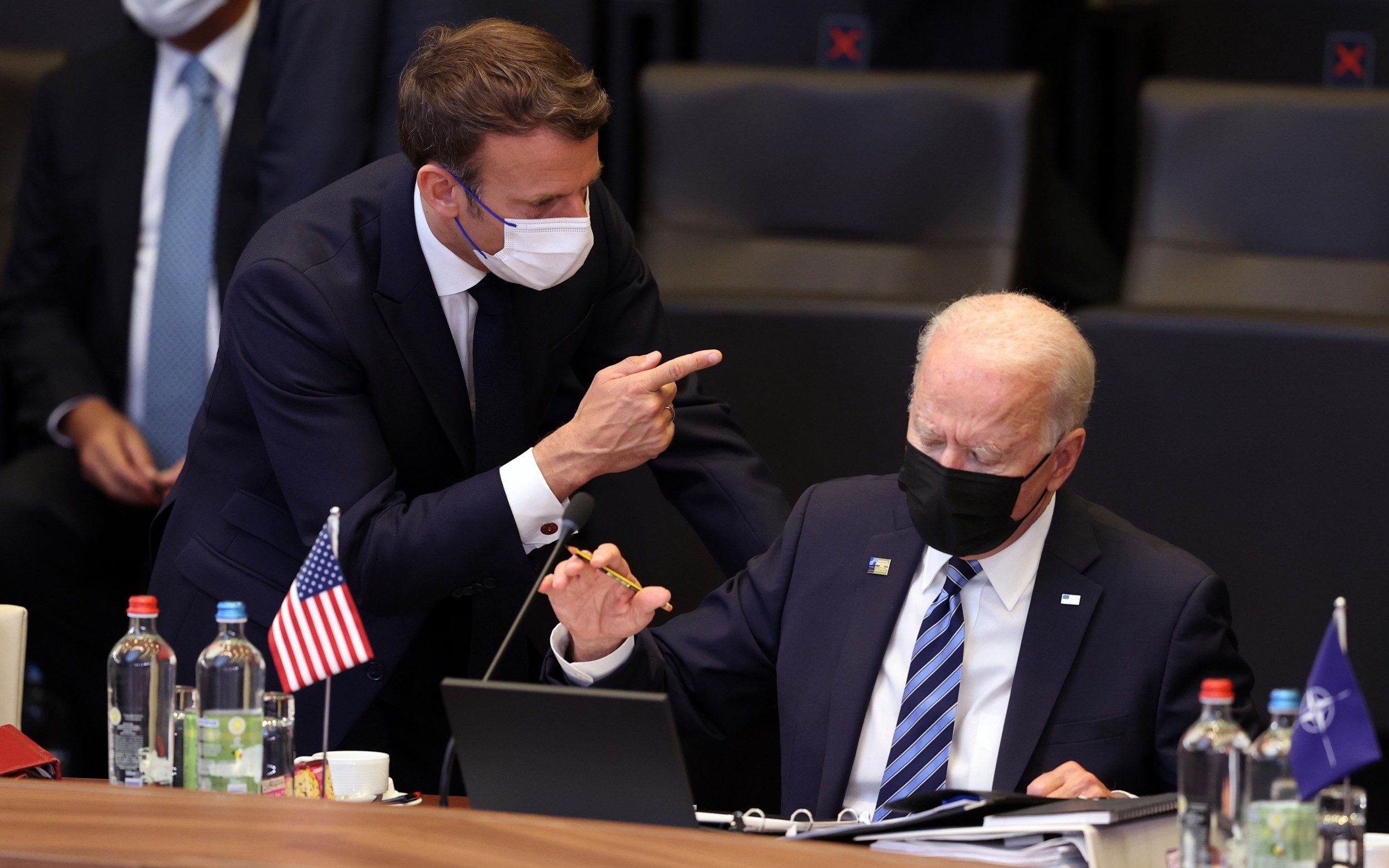Trans-Atlantic Trade Crisis: This Is How Biden's New Plan Affects Relations With Europe

In contrast to the unity shown by the Europeans and the Americans in confronting Russia over its war with Ukraine, the United States decided to fight inflation charged with the global economic crisis and war alike, which led to an escalation of tension between Europe and the United States over the US Inflation Reduction Act (IRA).
As Biden’s IRA pours hundreds of billions of dollars in subsidies on US giants, it simultaneously undermines their European competitors, while his popular campaign (Made in America) undermines transatlantic trade.
All this prompted the Europeans to accuse Washington of profiting from the Russian-Ukrainian war and accumulating their investments, in addition to undermining fair and free trade.
In a related context, The Economist magazine stated in a report on November 24, 2022, that American economic populism and geopolitical differences threaten the long-term competitiveness of the European Union, warning that the prosperity of the European continent and the health of the transatlantic alliance were at risk.
All this prompted French President Emmanuel Macron to raise the issue to his European partners and to form a front to combat these economic influences, calling for strict European policies to restore preference for European products in the EU markets in response to the protectionist policy of the United States, which cornered the European economy after its exports were denied access to China’s markets.
European Annoyance
After 8 months of the Russian-Ukrainian war, in which Europe has involved itself, it seems that the crisis between the United States and the EU has begun to explode into the open.
What exacerbated tensions between the two parties was the Biden administration’s decision to go it alone in its plan to fight inflation, leaving the EU countries facing a catastrophic economic situation, in addition to seeing their companies leave the lands of the old continent to invest in the United States.
On November 30, 2022, French President Emmanuel Macron issued unprecedented harsh criticism that revealed the extent of Europe’s annoyance with the US administration’s policies towards its European allies, warning that President Joe Biden’s policies threaten to fragment the West, according to what was reported by Agence France-Presse.
Macron warned, in a speech delivered to the French community at his country’s embassy in Washington, that the repercussions of the American plan to combat inflation will be disastrous for investments in Europe.
He stressed that energy issues and the cost of the war in Ukraine for Europe are not the same for the United States.
Macron confirmed that he denounced the very aggressive measures taken by President Biden to boost American industry, calling for better economic coordination between the two sides of the Atlantic Ocean, pointing out that this program creates differences between the United States and Europe.

This French and European annoyance is not a spur of the moment, as the features of a silent clash between the United States and the EU unfolded about a month ago when French Economy Minister Bruno Le Maire made press statements accusing Washington of trying to withdraw major companies to operate on its soil, away from Europe.
His statement came in his interview with several European newspapers on November 7, 2022, in which he revealed that “some major foreign companies that wanted to establish their headquarters in Europe are now hesitating between European and American locations.”
Le Maire explained that the reason for the hesitation of foreign companies is the subsidies that Washington pays to companies, pointing out that the race for subsidies violates all international trade rules, and calling for a coordinated, unified, and strong European response against that.
The French minister also revealed that “in some cases, the value of the subsidies provided to them by Biden’s administration ranges between 4 and 10 times the maximum amount allowed by the European Commission.”
In an interview with the French newspaper Les Echos on November 17, 2022, Prime Minister Elisabeth Borne vowed that her country would not stand idly by in the face of the massive US investment plan to combat inflation, which is likely to harm transatlantic trade competition and threaten the recession of the European industrial sector.
“The costs to France may reach €10 billion in investment and the loss of 10,000 potential jobs,” the French official added.
The statements of French officials threaten to return transatlantic trade relations to the stalemate they were during the term of President Donald Trump, who at the time imposed added taxes on European steel and aluminum exports.
According to observers, this would be against European interests that are mired in a broad energy crisis and are heading towards an expected economic recession.

Europe Is Losing Its Companies
Western sanctions imposed on Russia have led to higher energy prices across Europe, prompting scores of European companies to move to the United States, where taxes are lower, safety and environmental regulations are better, and labor rights are more appropriate, and thus, achieving much higher profits than staying in Europe, whose economy has been suffering badly lately.
The United States is not exposed to an energy crisis like the one that Europe is experiencing due to the Russian-Ukrainian war, as it can supply its own energy while it is far from the scene of the raging conflict in Europe, as well as supply chains in the United States are less risky than in Europe.
On its part, the European magazine Modern Diplomacy said, on September 27, 2022, that “European leaders cooperated with American leaders to bring about this European retreat by joining the US sanctions against Russia instead of refraining from that.”
On September 25, 2022, the German business daily Handelsblatt reported that “more German companies are relocating and expanding their sites in America, at a time when Berlin is becoming concerned and seeking countermeasures.”
“Many US states such as Virginia, Georgia, and Oklahoma are showing increasing interest in providing special incentives for German companies to transfer their business, or at least expand their production in the United States,” it added.
On September 25, the Irish Examiner magazine commented on the move of European companies to America, saying that “European industry buckles under weight of soaring energy prices.”
Volkswagen, Europe’s largest automaker, has warned that it may bring back production plans from Germany and eastern Europe if energy prices do not fall.
On the same day, the Oilprice.com website said, “Europe is facing an exodus of energy-intensive industries towards America.
It specifically mentioned that US steel giant ArcelorMittal said it would cut half of the production at a steel factory in Germany due to high gas prices in Europe, knowing that the same company had earlier decided to expand its operations in the US state of Texas.
In turn, the economist Dr. Yahya Sayed Omar explained in a statement to Al-Estiklal that “the bill on reducing inflation constitutes fertile material for economic and political debate,” pointing out that “the United States defends it, saying that it does not harm any economic partner, and that it is directed to the American market.”
He added, “On the other hand, the EU countries reject this bill, saying that it poses a threat to the European industry, as well as violating the laws of the World Trade Organization and restricting free competition.”
He explained that “after tax cuts and subsidies for American companies, their production costs will decrease, and thus they will be more competitive, which will harm European companies that will not be able to compete with the subsidized American product.”
Regarding the impact of the law on international trade between the East and West Atlantic, Dr. Sayed Omar pointed out that “European exports to the United States are expected to decline, but this matter does not include all European products, but will only include sectors related to clean energy that are covered by US support.”
About European measures, the economist said that “Europe is not only worried about the decline in European companies' exports to America, but it also fears that some investments will move from Europe to America in greed for tax incentives, which will put severe pressure on the European economy.”
He added, “Europe cannot imitate the United States, since its economy does not allow it to provide such huge subsidies. Here, it is expected that the focus will be on trade negotiation, especially since US President Biden announced, after European criticism, that it is possible to address some loopholes in the bill.”
As for the transfer of companies from Europe to America, Dr. Sayed Omar indicated that “this transfer allows companies, if it occurs, to benefit from tax benefits, since the inflation reduction law grants exemptions to all companies operating in the United States, regardless of their nationality.”
As for Biden's abandonment of the European partner, he stressed that this is not expected, just as the effect of the bill on Europe will not be general, in addition to the fact that the damage does not include all countries alike, the main victim is Germany, for which it is possible to provide American guarantees.

Made In America
In the same context, the French newspaper Le Monde revealed, on November 26, 2022, that European leaders fear that European companies will prefer the United States in their investments and production due to the expected huge subsidies for green products made in America.
The newspaper pointed out that when the European Union faces a problem with its American ally, the European Union always finds it difficult to admit it.
“However, in the past few days, the countries of the European Union have shown great concern about the policy of US President Joe Biden, who seems willing to sacrifice the economy of the European ally when it comes to defending the US economy,” the newspaper added.
On its part, the Washington Post reported, on November 3, 2022, that American leaders have historically relied on the label Made in America as a slogan and aspiration that defines American economic life, noting that it is imperative to preserve American jobs, strengthen the economy, and protect national security.
The label Made in America has become a cultural symbol of American global dominance, in addition to being a powerful political idea and a ready acronym for US power and economic prowess.

Thanks to its cheap energy, which it sells to Europe at four times the cost, which has given it a decisive competitive advantage over the European continent since the start of the war on Ukraine on February 24, the United States also decided to provide significant support for Made-in-America products by investing about $369 billion to support products that are manufactured on American soil, especially electric cars, solar panels, and batteries, under the inflation reduction law that will take effect on January 1, 2023.
After a long delay described by observers, trade ministers of EU countries met on November 25, 2022, to begin discussing Biden’s policy to stimulate green industries that bear the label Made in America.
As Le Monde quoted a European diplomatic comment he made: “At first, we underestimated the consequences of the American strategy, but the Europeans are beginning to realize that it could have a catastrophic impact on our economy.”
For EU countries, in very concrete terms, this means the risks of seeing their companies leave Europe to invest across the Atlantic, an exodus that has already begun.
On the other hand, the Americans see that criticizing their country is a favorite tactic for the political elites in Europe when things start to get bad on the continent and that most of Europe’s current crises are the result of the mistakes of the leaders of the EU countries, as reported by Politico on November 30, 2022.
The newspaper believes that the disturbing truth is that the Europeans are having difficulty convincing their companies to invest at home because governments focus more on subsidizing household gas bills rather than helping the industry in the region to overcome the crisis.
According to analysts, despite the high tone of European statements, Brussels will not risk escalation with Washington but rather aspires to find a diplomatic compromise for European automakers and their suppliers, away from the outbreak of any new trade war, European officials told Politico.

It is planned that European leaders will meet their American counterpart at an EU-US summit on December 5, 2022, which comes under the pressure of these economic fears of the tensions in trade relations between the two economic powers, and undermining the efforts of Biden and Ursula von der Leyen to overcome the consequences of the Trump era.
Discussions are currently taking place between Washington and the European Commission, which appeals to the United States not to discriminate against European products in its subsidies and to give them preferential treatment like those obtained by Canada and Mexico.
Sources
- Macron slams US subsidies as 'super aggressive' towards French companies
- Europe faces an enduring crisis of energy and geopolitics
- Bruno Le Maire: The real risk for Europe is industrial stalling [French]
- Energy, innovation, purchasing power: Elisabeth Borne's answers [French]
- How America Is Crushing Europe
- German companies are constantly expanding their locations in the USA [German]
- European industry buckles under weight of soaring energy prices
- Europe Faces An Exodus Of Energy-Intensive Industries
- Europe is struggling to find a response to US anti-inflation plan
- The label ‘Made in America’ and the motives behind it aren’t so simple
- Europe’s anti-American itch











